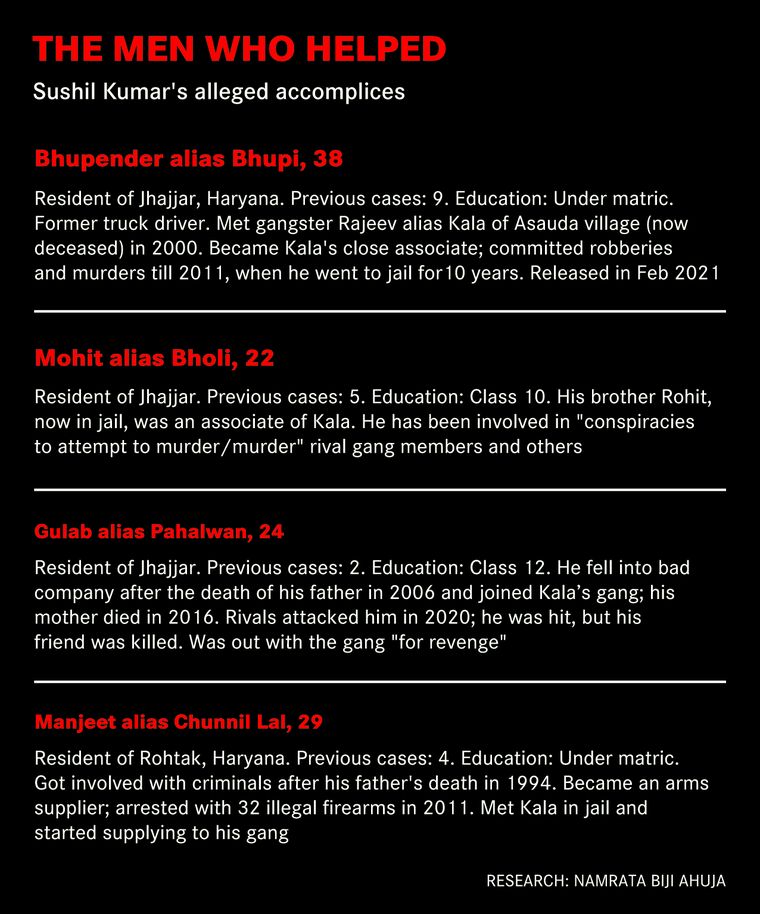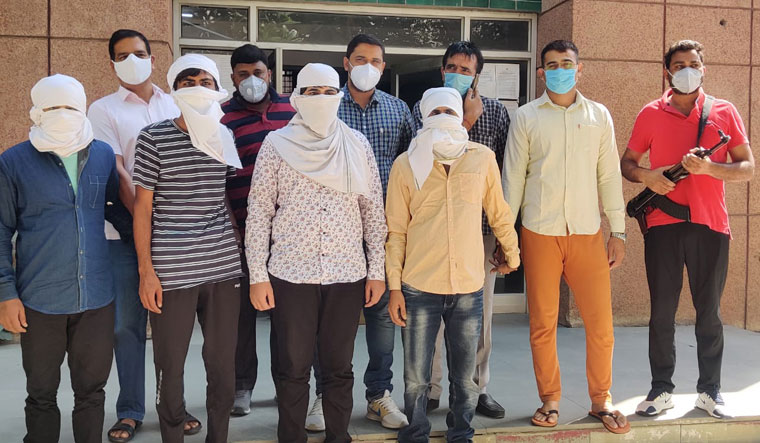Sushil Kumar and Delhi’s Chhatrasal Stadium are inextricably linked, it seems.
He first came to the stadium as a 14-year-old rookie, hoping to learn the finer points of wrestling from the legendary Satpal Singh—coach, stadium administrator and, as it would turn out, his father-in-law. After a decade of learning the ropes and scoring many a famous win on the mat, Sushil created history in Beijing in 2008. He became the first Indian since K.D. Jadhav (Helsinki 1952) to win an Olympic bronze in wrestling. Most people would have been happy to hang up their boots there, but not Sushil. Four years later, at the London Olympics, he did himself one better—he won silver.
In 2015, Sushil began grappling with another challenge. He joined the Delhi government on deputation from Northern Railways, as an officer on special duty for promoting sports at the school level. As president of the School Games Federation of India (SGFI), Sushil took over from his father-in-law—he was now the legend looking for promising rookies.
Sushil’s dream-come-true story, however, came crashing down on May 4 this year. The nightmare began at the same place where the dream had begun—the Chhatrasal Stadium. That day, Sushil and a group of wrestlers allegedly attacked Sagar Dhankar, a 23-year-old former junior wrestling champion, in the stadium’s parking area. Two of Sagar’s friends, too, were badly beaten up. Sagar later succumbed to injuries.
Sushil and his accomplices soon went absconding. The police finally tracked him down on May 23, three days before his 38th birthday. The sight of the wrestler being produced in court by armed policemen was in sharp contrast with his moments of glory in Beijing and London. An icon had fallen from grace.
Investigators say Sushil was allegedly mixed up with several gangsters, who often respectfully referred to him as “pehelwanji”. If the many serious charges against him are proven true, Sushil could spend years in prison and be stripped of several honours he had won—including the Khel Ratna and Arjuna awards and the Padma Shri.
“As per the principles of jurisprudence, a person is innocent until proven guilty,” Union Sports Minister Kiren Rijiju told THE WEEK. “The ministry will not take a decision in haste. We will take a call once things are clearer in judicial terms.”
Both Sushil and Sagar, son of a head constable in the Delhi Police, had clean records. But some of their associates, apparently, did not. Both of them had links to gangsters and bouncer-cum-wrestlers, who often help the rich and powerful close murky land deals. Investigators say Sushil was associated with notorious Delhi-based gangsters Neeraj Bawana and Kala Asauda, while Sagar had connections to the rival Kala Jatheri gang, which is active near the Delhi-Haryana border. Kala Jatheri, whose real name is Sandeep Kala, is a wanted criminal believed to be hiding in Dubai; he was earlier said to be in Thailand.
Officers say Sushil was once close to the Jatheri gang, but fell out with it over property disputes. “Sagar was a good wrestler, but his friend Sonu Mahal is a known criminal with nearly two dozen cases against him,” said a police officer. Sonu is Jatheri’s nephew.
Officers say Sushil had “disturbed” the inter-gang power balance. “The respect for him in wrestling circles was such that he could make people listen to him with just a phone call,” said an investigator. Depending on which side they were on, gangsters could either love him or hate him. But the wrestlers who worked for them—many from villages near the Haryana border—all looked at Sushil with awe.
According to the Delhi Police, Sushil’s history with the Bawana-Asauda gang goes back years. Kala Asauda (born Rajeev, at Asauda village in Haryana’s Jhajjar district) was shot dead outside a court in Rohtak. He had been on trial for allegedly killing the Asauda sarpanch in 2016.
Investigators began unearthing the web of Sushil’s shady connections on May 25, 2021, after an informant told them that four gangsters who had assaulted Sagar were travelling to Ghewra village, near Asauda, to meet an associate. The Delhi Police swooped down on Ghewra and arrested all four—Bhupender, 38; Manjeet, 29; Mohit, 24; and Gulab, 24. All four belong to the Asauda gang and have non-bailable warrants against them. The gang is now led by Bhupender and Manjeet, apparently. Bhupender, who has nine cases against him, was in jail till February this year. Manjeet allegedly runs guns across the Delhi-Haryana border. After Kala Asauda’s death, Bhupender and Manjeet joined hands with Bawana’s gang. Bawana is in Tihar Jail on charges of murder, extortion and land grabbing.
The Delhi Police say Sushil summoned the four gangsters to the Chhatrasal Stadium to attack Sagar and friends. The gangsters have apparently confessed to the police that they had reached the stadium at around midnight in two SUVs to beat up Sagar. The confessions, along with a video of the assault they had shot on phone, are said to be clinching evidence of Sushil’s involvement. The Central Forensic Science Laboratory is expected to certify the authenticity of the video.
“Investigation is on to determine Sushil Kumar’s links with [the four gangsters],” said Pranav Tayal, deputy commissioner of police. “One thing is clear, though: They reached the stadium only after Sushil contacted them.”
Shots were fired during the assault, after which the nearby police station was alerted. The police unit that reached the spot found Sagar and his friends grievously injured. They were rushed to hospital. There were five cars in the parking area, including the SUVs the gangsters had arrived in. “[They] could not escape with their vehicles when they heard the police siren,” said Tayal. “So, they left behind their vehicles and weapons.”
A double-barrel gun and three rounds of ammunition were seized from one vehicle. Two wooden sticks were recovered from the parking lot. After registering a case against them, the police immediately tried to track down Sushil and his associates. But by then, they had gone into hiding.
The police say Bawana had been working from jail to expand his network. He had apparently joined hands with Naveen Bali, another jailed gangster. The inquiry is likely to reveal shady land deals in which Sushil could have been involved.
As of now, the Crime Branch has custody of Sushil till June 3. The Delhi Police have charged him with sections 302 (murder), 308 (culpable homicide), 365 (kidnapping), 325 (causing grievous hurt), 323 (voluntarily causing hurt), 341 (wrongful restraint), and 506 (criminal intimidation) of the Indian Penal Code. If the police decide to book Kumar under the stringent Maharashtra Control of Organised Crime Act—which was extended to Delhi in 2002—it will get six months to file the charge-sheet. But sources said the Crime Branch case might not qualify for MCOCA sections.
On his part, Sushil has denied all charges and is trying to obtain bail. “The victims are falsely implicating the applicant because he had asked Sagar to leave his property as the same was being misused by him,” says his bail plea.
According to Sushil, people had been trying to falsely implicate him in criminal cases. Last year, the SGFI under him had run into trouble with the Union sports ministry over alleged violations of the 2011 National Sports Development Code. Sushil himself had made allegations of fraud against the federation’s secretary. The Delhi government had recently decided not to give him an extension as officer on special duty.
Sushil’s image had taken a beating in recent years. He had started missing major tournaments as early as 2014, including the Asian Games that year. He opted out of the world championships in Las Vegas in 2015, following which he was left out of the squad for the 2016 Rio De Janeiro Olympics. In 2018, he pulled out of the Pro Wrestling League launched by the Wrestling Federation of India, alleging that the league’s commercial partner had ill-treated him. But it was said that he was miffed at being offered a fee that was lower than what fellow Olympic medal-winner Yogeshwar Dutt had received. Sources say Sushil’s father-in-law also contributed to the worsening of relations between him and the WFI.
The bitter fight over the selection process for the Rio Olympics was apparently a turning point. Soon after Sushil pulled out of the Pro Wrestling League, the WFI announced that there would be no selection trials for the 74kg category, in which Sushil was expecting a berth. He unsuccessfully moved the Delhi High Court against the WFI decision. Later, Narsingh Yadav, who had won the Olympic berth, alleged that he was being pressured to quit and that his life was under threat. Yadav was later caught in a doping controversy and could not compete in Rio. His allegations that Sushil had sabotaged his career triggered a CBI inquiry, but nothing came of it.
Meanwhile, fellow wrestlers had started distancing themselves from Sushil. Bajrang Punia, who is India’s top medal hope in this year’s Tokyo Olympics, had to leave the Chhatrasal akhada after locking horns with Sushil in 2015. One-time confidant Yogeshwar, too, had a public fallout with Sushil in 2016.
Sushil’s behaviour had also been raising eyebrows. His love for guns grew to such an extent that, during a meeting organised by Northern Railways, he reportedly showed off a fully loaded pistol to a shocked fellow Olympian! People had also begun noticing that he was keeping bad company. His links to the toll mafia in Delhi had become a talking point, with many people commenting on his entourage of musclemen and armed security personnel. There were reports that goons were allegedly “using” Sushil’s name to evict people from disputed properties in Delhi.
Also, there was the case of wrestler Praveen Rana, who was Sushil’s opponent in the selection trials for the Commonwealth Games in 2018. Praveen and his brother were attacked by people who were allegedly Sushil’s supporters. The assault left Rana and his brother hospitalised, and a first information report was filed against Sushil and his associates.
Sushil’s bid to qualify for the Tokyo Olympics failed the same year, after he suffered a shock defeat in the 74kg category in a qualifying round in Jakarta. This led to the Sports Authority of India dropping him from its prestigious Target Olympic Podium Scheme.
It appears that the murder case has now brought the curtain down on his illustrious wrestling career. A life of guilt and shame is what could be waiting for him. Sushil, according to the police, had broken down during interrogation, saying his aim was to test Sagar’s strength and not to kill him. A confession, however, is apparently still not forthcoming.
“It will be premature to conclude anything at this stage,” said Shibesh Singh, additional commissioner of police (crime). “And the leak of any crucial piece of information can jeopardise the investigation.”




